(完整版)一般现在时用所给词的适当形式填空
(完整版)小学英语一般现在时习题集(200题)(可编辑修改word版)
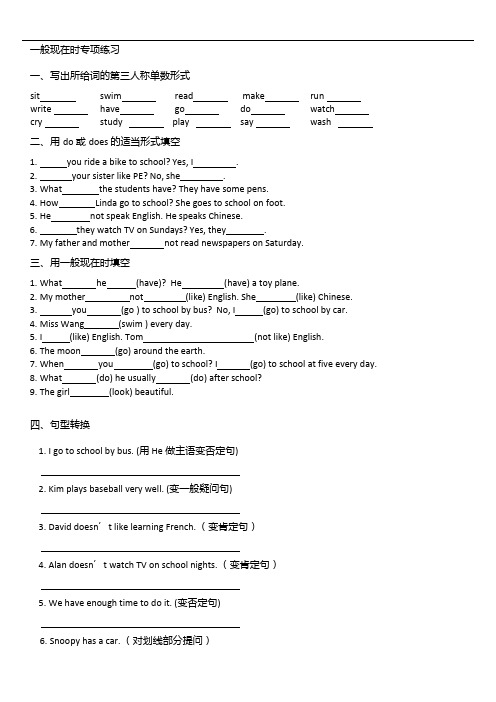
一般现在时专项练习一、写出所给词的第三人称单数形式sit swim read make runwrite have go do watchcry study play say wash二、用do 或does 的适当形式填空1.you ride a bike to school? Yes, I .2.your sister like PE? No, she .3.What the students have? They have some pens.4.How Linda go to school? She goes to school on foot.5.He not speak English. He speaks Chinese.6.they watch TV on Sundays? Yes, they .7.My father and mother not read newspapers on Saturday.三、用一般现在时填空1.What he (have)? He (have) a toy plane.2.My mother not (like) English. She (like) Chinese.3.you (go ) to school by bus? No, I (go) to school by car.4.Miss Wang (swim ) every day.5.I (like) English. Tom (not like) English.6.The moon (go) around the earth.7.When you (go) to school? I (go) to school at five every day.8.What (do) he usually (do) after school?9.The girl (look) beautiful.四、句型转换1.I go to school by bus. (用He 做主语变否定句)2.Kim plays baseball very well. (变一般疑问句)3.David doesn’t like learning French. (变肯定句)4.Alan doesn’t watch TV on school nights. (变肯定句)5.We have enough time to do it. (变否定句)6.Snoopy has a car. (对划线部分提问)7.Do you have a pencil? (把主语改成she)8.They play basketball in the park on Sunday morning.(对划线提问)○1 ○2 ○3I、用括号中所给词的适当形式填空:1.The buses (use) a lot of oil.2.Each of us (have) strong points and weak points.3.My daughter (watch) TV every day. Sometimes she (see) a film on Sunday.4.Li Wei (have) a daughter. She stays in a nursery.5.Our family (be) a happy one.6.Her mother (teach) English at a middle school.7.Jack often (listen) to the radio.8.He (say) that Prof. Li is tired.改句子1.This is my pencil.(变一般疑问句) your pencil ?2.These red socks are Kate’s . (变一般疑问句)_ socks Kate’s ?3.I want to buy a big green bag . (变特殊疑问句) you want to buy ?4.Mary does not have any books . (变肯定句)Mary books .5.The clothing shop is on sale . (变为否定) .6.She likes the black bag very much . (变为否定句) .7.I buy the pants for only 50 Yuan. (用she 改写句子) the pants for only 50 Yuan.8.It’s an English dictionary . (对画线部分提问) ?9.Lily and Lucy are fifteen years old now . (对画线部分提问) Lily and Lucy ?10.Her dog is 2 years and 5 months old . (变为否定句) Her dog 2 years and 5 months old .11.We live in Nanchang. (改为否定句) We in Nanchang .12.It’s lunch time.(改为同义句)It’s .13.My sweater is black and white. (对划线部分提问) is sweater?14.She has long, black hair. (改为同义句) hair long and black.15.. They are three blue desks. (对划线部分提问) they?用所给动词的适当形式填空。
(完整版)小学英语一般现在时习题集(200题)
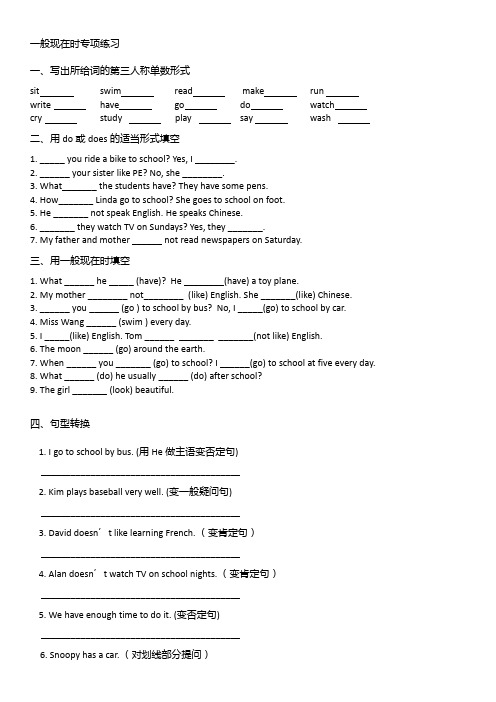
一般现在时专项练习一、写出所给词的第三人称单数形式sit swim read make runwrite have go do watchcry study play say wash二、用do或does的适当形式填空1._____you ride a bike to school?Yes,I________.2.______your sister like PE?No,she________.3.What_______the students have?They have some pens.4.How_______Linda go to school?She goes to school on foot.5.He_______not speak English.He speaks Chinese.6._______they watch TV on Sundays?Yes,they_______.7.My father and mother______not read newspapers on Saturday.三、用一般现在时填空1.What______he_____(have)?He________(have)a toy plane.2.My mother________not________(like)English.She_______(like)Chinese.3.______you______(go)to school by bus?No,I_____(go)to school by car.4.Miss Wang______(swim)every day.5.I_____(like)English.Tom____________________(not like)English.6.The moon______(go)around the earth.7.When______you_______(go)to school?I______(go)to school at five every day.8.What______(do)he usually______(do)after school?9.The girl_______(look)beautiful.四、句型转换1.I go to school by bus.(用He做主语变否定句)________________________________________2.Kim plays baseball very well.(变一般疑问句)________________________________________3.David doesn’t like learning French.(变肯定句)________________________________________4.Alan doesn’t watch TV on school nights.(变肯定句)________________________________________5.We have enough time to do it.(变否定句)________________________________________6.Snoopy has a car.(对划线部分提问)______________________________________7.Do you have a pencil?(把主语改成she)_____________________________________________8.They play basketball in the park on Sunday morning.(对划线提问)○1○2○3_________________________________________________________________________________________________________________________________________________________________________________________________________I、用括号中所给词的适当形式填空:1. The buses______(use)a lot of oil.2. Each of us______(have)strong points and weak points.3. My daughter_________(watch)TV every day.Sometimes she_______(see)a film on Sunday.4. Li Wei________(have)a daughter.She stays_______in a nursery.5. Our family_________(be)a happy one.6. Her mother___________(teach)English at a middle school.7. Jack often___________(listen)to the radio.8. He________(say)that Prof.Li is_____tired.改句子1. This is my pencil.(变一般疑问句)____ _______________ your pencil ?2.Thes.re.sock.ar.Kate’..(变一般疑问句).___________________.sock.Kate’...3..wan.t.bu..bi.gree.ba..(变特殊疑问句._________________.yo.wan.t.bu..4.Mar.doe.no.hav.an.book..(变肯定句)Mar.___________________book...5.Th.clothin.sho.i.o.sal..(变为否定)________________________________.6.Sh.like.th.blac.ba.ver.muc..(变为否定句.______________________________.7..bu.th.pant.fo.onl.5.Yuan.(用she改写句子)__.________________.th.pant.fo.onl.5.Yuan.8.It’.a.Englis.dictionar..(对画线部分提问.____________________________.9.Lil.an.Luc.ar.fiftee.year.ol.no..(对画线部分提问)____._______________Lil.an.Luc..10.He.do.i..year.an..month.ol..(变为否定句. He.do.___.____..year.an..month.ol...11.W.liv.i.Nanchang.(改为否定句.W.___.___.___.i.Nanchan..12.It’.lunc.time.(改为同义句.It’._____._____._____.......13.M.sweate.i.blac.an.white.(对划线部分提问._____._____.i._____.sweater.14.Sh.ha.long.blac.hair.(改为同义句.___.hai.___.lon.an.black.15..The.ar.thre.blu.desks.(对划线部分提问.___.___.they?用所给动词的适当形式填空。
七年级英语时态汇总(一般现在时_一般过去时和现在进行时)_1
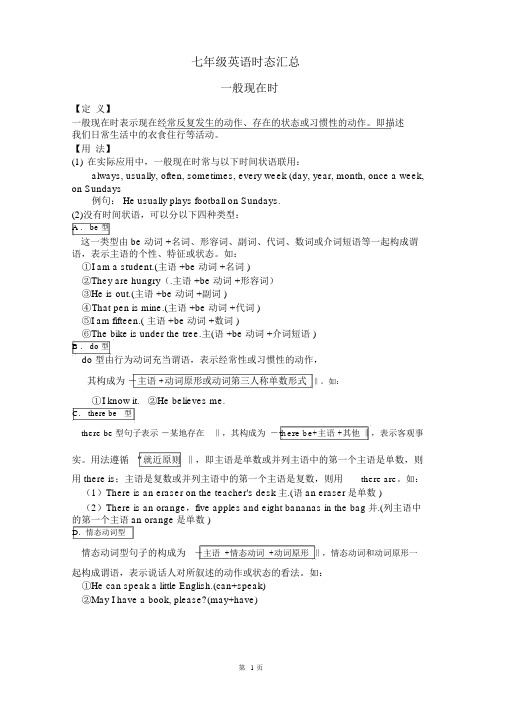
七年级英语时态汇总一般现在时【定义】一般现在时表示现在经常反复发生的动作、存在的状态或习惯性的动作。
即描述我们日常生活中的衣食住行等活动。
【用法】(1)在实际应用中,一般现在时常与以下时间状语联用:always, usually, often, sometimes, every week (day, year, month, once a week, on Sundays例句: He usually plays football on Sundays.(2)没有时间状语,可以分以下四种类型:A . be 型这一类型由 be 动词 +名词、形容词、副词、代词、数词或介词短语等一起构成谓语,表示主语的个性、特征或状态。
如:①I am a student.(主语 +be 动词 +名词 )②They are hungry(.主语 +be 动词 +形容词)③He is out.(主语 +be 动词 +副词 )④T hat pen is mine.(主语 +be 动词 +代词 )⑤I am fifteen.( 主语 +be 动词 +数词 )⑥The bike is under the tree.主(语 +be 动词 +介词短语 )B . do 型do 型由行为动词充当谓语,表示经常性或习惯性的动作,其构成为―主语 +动词原形或动词第三人称单数形式‖。
如:①I know it. ②He believes me.C. there be型there be型句子表示―某地存在‖,其构成为―there be+主语+其他‖,表示客观事实。
用法遵循“就近原则‖,即主语是单数或并列主语中的第一个主语是单数,则用 there is;主语是复数或并列主语中的第一个主语是复数,则用there are。
如:(1)There is an eraser on the teacher's desk主.(语 an eraser是单数 )(2)There is an orange,five apples and eight bananas in the bag并.(列主语中的第一个主语 an orange是单数 )D.情态动词型情态动词型句子的构成为―主语+情态动词+动词原形‖,情态动词和动词原形一起构成谓语,表示说话人对所叙述的动作或状态的看法。
初二英语用所给词的适当形式填空全解及练习(附答案)
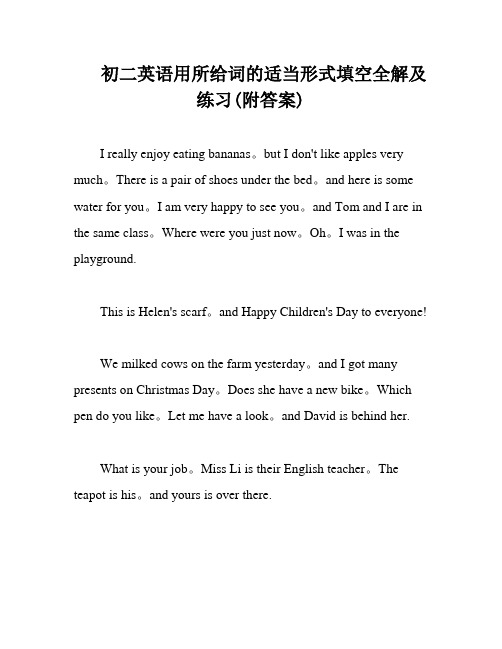
初二英语用所给词的适当形式填空全解及练习(附答案)I really enjoy eating bananas。
but I don't like apples very much。
There is a pair of shoes under the bed。
and here is some water for you。
I am very happy to see you。
and Tom and I are in the same class。
Where were you just now。
Oh。
I was in the playground.This is Helen's scarf。
and Happy Children's Day to everyone!We milked cows on the farm yesterday。
and I got many presents on Christmas Day。
Does she have a new bike。
Which pen do you like。
Let me have a look。
and David is behind her.What is your job。
Miss Li is their English teacher。
The teapot is his。
and yours is over there.I have one banana。
but he has two bananas。
This is the first time I've eaten this type of apple。
Can you please give me thethird pencil。
She always comes in fourth place in the race.基数词用来表示数量,例如:There are five birds in the tree.序数词用来表示顺序,例如:March is the third month in a year.常见的序数词有:first、second、third等,需要注意拼写。
用所给词的适当形式填空要点归纳及综合练习
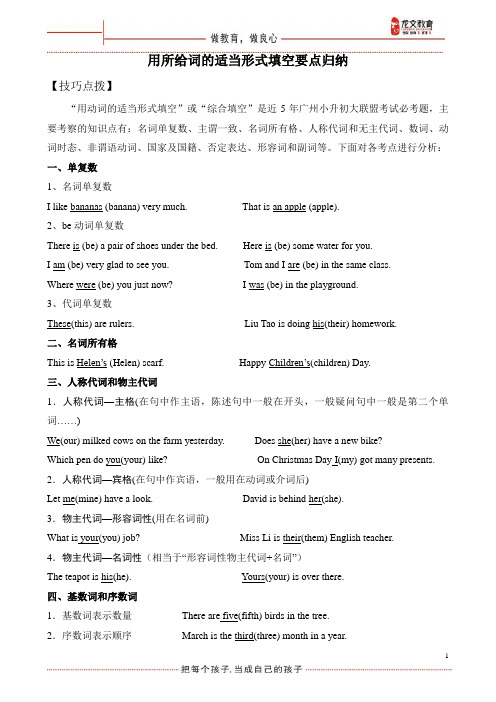
用所给词的适当形式填空要点归纳【技巧点拨】“用动词的适当形式填空”或“综合填空”是近5年广州小升初大联盟考试必考题,主要考察的知识点有:名词单复数、主谓一致、名词所有格、人称代词和无主代词、数词、动词时态、非谓语动词、国家及国籍、否定表达、形容词和副词等。
下面对各考点进行分析:一、单复数1、名词单复数I like bananas (banana) very much. That is an apple (apple).2、be动词单复数There is (be) a pair of shoes under the bed. Here is (be) some water for you.I am (be) very glad to see you. Tom and I are (be) in the same class.Where were (be) you just now? I was (be) in the playground.3、代词单复数These(this) are rulers. Liu Tao is doing his(their) homework.二、名词所有格This is Helen’s (Helen) scarf. Happy Children’s(children) Day.三、人称代词和物主代词1.人称代词—主格(在句中作主语,陈述句中一般在开头,一般疑问句中一般是第二个单词……)We(our) milked cows on the farm yesterday. Does she(her) have a new bike?Which pen do you(your) like? On Christmas Day I(my) got many presents. 2.人称代词—宾格(在句中作宾语,一般用在动词或介词后)Let me(mine) have a look. David is behind her(she).3.物主代词—形容词性(用在名词前)What is your(you) job? Miss Li is their(them) English teacher.4.物主代词—名词性(相当于―形容词性物主代词+名词‖)The teapot is his(he). Yours(your) is over there.四、基数词和序数词1.基数词表示数量There are five(fifth) birds in the tree.2.序数词表示顺序March is the third(three) month in a year.五、动词—时态1.一般现在时A.主语为第三人称单数,动词要加―-s‖或―-es‖He lives(live) in a small town. Yang Ling often goes(go) to school by bike.在否定句或疑问句中,已有did,动词就用原形。
用所给词的适当形式填空要点归纳
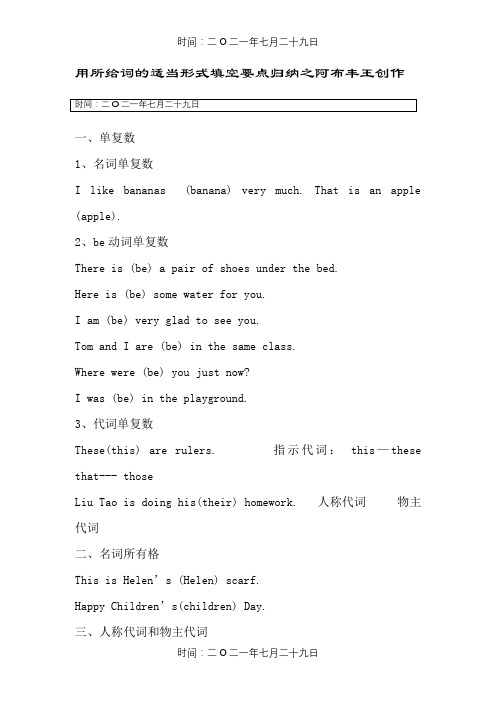
用所给词的适当形式填空要点归纳之阿布丰王创作一、单复数1、名词单复数I like bananas (banana) very much. That is an apple (apple).2、be动词单复数There is (be) a pair of shoes under the bed.Here is (be) some water for you.I am (be) very glad to see you.Tom and I are (be) in the same class.Where were (be) you just now?I was (be) in the playground.3、代词单复数These(this) are rulers. 指示代词:this—these that--- thoseLiu Tao is doing his(their) homework. 人称代词物主代词二、名词所有格This is Helen’s (Helen) scarf.Hap py Children’s(children) Day.三、人称代词和物主代词1.人称代词—主格(在句中作主语,陈说句中一般在开头,一般疑问句中一般是第二个单词……)We(our) milked cows on the farm yesterday.Does she(her) have a new bike?Which pen do you(your) like?On Christmas Day I (my) got many presents.—宾格(在句中作宾语,一般用在动词或介词后)Let me(mine) have a look.David is behind her(she).3物主代词—形容词性(用在名词前)What is your(you) job?Miss Li is their(them) English teacher.4.物主代词—名词性(相当于“形容词性物主代词+名词”)The teapot is his(he).This is my book. Yours(your) is over there.四、基数词和序数词1.基数词暗示数There are five(fifth) birds in the tree.2.序数词暗示顺序March is the third(three) month in a year.五、英语动词填空题答题技巧用所给动词的适当形式填空,是英语中考中必考的一个题型.在做题时要看主语,按时态,注意主谓一致.重点是动词的时态.英语中的时态主要就是八年夜时态.一般现在时,一般过去时,现在进行时,过去进行时,现在完成时,过去完成时,一般将来时,(过去将来时).何种情况下该使用哪种时态,每种时态中明显的标识表记标帜词,主要是时间状语,除考察动词时态外,还考察各种时态的分歧语态-----主动语态和主动语态.在动词短文填空中还经常考察的一个知识点就是and连接的几个动词时态相同这一做题技巧还有就是to do不定式做目的状和V-ing现在分词表陪伴的情形.还有一些非常重要的动词短语.可以按后必需接doing的,后面必需接to do的,后既可接doing 又可接to do的进行归纳总结.如后必需接doing的,practice doing sth, think about doing, what about doing ,thank you for doing, be interested in doing ,be good at doing, do well in doing, by doing sth, finish doing,can’t help doing , can’t stop doing, have trouble doing , have problems doing , have difficulty doing, look forward to doing , feel like doing, stop sb from doing, keep doing , keep sb. doing, enjoy doing sth 等.后面必需接to do 的.want to do, would like(love)to do, can’t wait to do 等,后面既可接to do , 又可接doing 的,like, love ,hate.接to do, doing意思分歧的,stop, remember, forget等.还有make sb. do , sb.be made to do, see, hear ,watch, notice 等动词的用法.强化记忆,确保准确无误.(一)动词—时态1.一般现在时A.主语为第三人称双数,动词要加“-s”或“-es”He lives(live) in a small town. Yang Ling often goes(go) to school by bike.在否定句或疑问句中,已有do, don’t, does, doesn’t, 动词就用原形.She doesn’t go(go) to school on Saturday and Sunday.Does Ben like(like) animals?B.其它情况,动词用原形I usually have(have) lunch at half past eleven.They read(reads) English everyday.2.现在进行时----be+现在分词”Look, I am drawing (draw) a monkey.Listen, the students are singing(sing) an English song. 3.一般过去时A.规则变动:动词词尾加“-ed”She picked(pick) a lot of pears and tasted(taste) them last weekend.B.不规则变动The mobile phone was(is) on the table just now.We had(have) a good time on New Year’s Day.C.在否定句和疑问句中,已有did, didn’t,动词就用原形. Did you visit(visit) the zoo on Monday?They didn’t watch(watch) TV yesterday evening. 4.一般将来时A.be going to+动词原形He is going to buy(buy) some notebooks.B.will+动词原形They will go(go) home tomorrow.(二)、动词1.不定式I would like to drink(drink) some coffee.She wants to have (have) a birthday party.2.动名词I like playing (play) basketball.It’s time for swimming(swim).(三)其它1.情态动词+动词原形She can dance(danced) beautifully.It means you shouldn’t smoke(smoking) here.2.祈使句中,谓语动词用原形Stand(stand) up, please.六、国家和国籍Nancy comes from America(America).She is American(America).七、形容词和副词及其比力品级He is a good(well) boy.His English is good(well).Please listen carefully(careful). ------ Please listen to me carefully.He can skate vell(good)Jim is taller (tall) than Tom.English is as important as Chinese. (important)Li Ming is one of the best students in his class.(good)八、否定Mr Green goes to work by bike every day, but Mrs Green doesn’t (does).否定词:not, no, little, few, never, nothing, nobody, no one, too…to, either(too/as well, also区分“也”), neither, hardly, seldom(很少)除否定词not可用于构成否定句外,还有其他一些否定词语可以暗示否定:1. 用no暗示.其意为“没有”:We have no children of our own. 我们没有自己的孩子.I’ve got no news from him. 我没听到他的消息.【注】no后接名词时也可换成not… any:I have no friends here. I don’t have any friends here. 我在这儿没有朋友.2. 用never暗示.其意为“从不”:I have never been there. 我从未去过那儿.That will never do. 那决不成.3. 用little, few暗示.little用于指不成数名词,few用于指可数名词,均暗示“很少”:There is little time left. 没什么时间了.Few people like snakes. 很少有人喜欢蛇.【注】若在其前用不定冠词a,则暗示肯定意义:There is a little time left. 还有点点时间.A few people like snakes. 有少数人喜欢蛇. ( a little用于指不成数名词,a few 指可数名词, 暗示“有一点”)4. 用nobody, no one, nothing暗示.nobody和no one用于指人,其意为“没有人”;nothing用于指物,其意为“没有任何工具”:No one [Nobody] wants to go there. 没有人想去那儿.She said nothing. = She didn’t say anything. 她什么也没说,5. 用none暗示.意为“没有人或物”:None of the pupils knew the answer. 学生中谁都不知道谜底.None of this milk can be used. 这牛奶一点都不能用了.6. 用neither暗示.意为“两者都不”:I like neither of the books. 这两本书我都不喜欢.Neither of us enjoys getting up early. 我们俩谁也不喜欢早起.7. 用seldom暗示.seldom是频度副词,意思是“很少,罕见,难得”. seldom具有否定意味,在句中一般位于系动词、情态动词、助动词之后、实义动词之前.The children are seldom ill. 这些孩子很少生病.It seldom snows here. 这儿很少下雪.8. 用hardly暗示.意为“几乎不”:He hardly ever eats meat. 他几乎从不吃肉.Jim is hardly ever late. 吉姆几乎从不迟到.9. 用too…to暗示.该结构虽不含否定词,但含有否定含义,意为“太…以致不能…”:It is too late to do anything now. 现在要做什么已为时太晚.I’m too tired to go any farther. 我太累了,走不动了.语法点归纳:1. Like + 动名词如:like swimming2. Like + 名词的复数如:I like bananas.3.go + 动名词“去做某事“如:go climbing, go shopping, go swimming4. How many + 名词复数“几多“问数量如: how many watches5.different + 名词复数“分歧的”如:different countries6. Same 前加the , 后面一般跟双数,如: the same hobby 7.序数词前一定加the ,如:the first day8.在几点用 at, 如 at 7 o’clock ,在某一天或某一天的具体时间段用on ,如:on Sunday, on Sunday morning, 直接暗示在早上、下午或晚上等不具体的时间用in,如:in the morning, in May, in 1999.9.动词后代词用宾格(动宾)如:join me10.介词后代词用宾格(介宾)如:with him ,for her11. want to +动原 , would like to + 动原 , sorry to + 动原 ,forget to + 动原,it’s time to + 动原,12.情态动词can后面加动原,let /make使役动词后加动原13.祈使句中动词用原形,否定句在句首加Don’t14.助动词(do, does, don’t , doesn’t)后动词用原形15.形容词加名词(形名)如: a beautiful girl形容词作表语放在系动词后:be; keep/ stay; look/ seem/appear; become, grow, turn, get; feel,taste,look, sound, smell;(一是;二保;三看;四变;五起来)That sounds good. Please keep quite.16.动词加副词(动副)如: dance beautifully※形容词是用来修饰名词的,常被放在名词前作定语,或放在系动词后面作表语,修饰由不定代词one、no、any、some和every构成的复合不定代词如anything、something等时,通常后置(不形).而副词则用来修饰形容词、动词,其他副词或者句子,一般位于形容词之前,动词之后或句子之首.下列单词以-ly结尾,但却是形容词而非副词:lively、lonely、lovely、friendly、ugly、silly 等.Luckily, I get good grades in the exam. Unluckily, I hurt my leg.17.Some 用于肯定句或委婉请求的一般疑问句,any 用于否定句”任何,一些“.any other+ 双数名词18.There be 结构就近原则如:There is a teacher and some students in the classroom.19.不成数名词:water, coffee, tea, milk, juice, bread, rice, food, fruit ,paper, chocolate, exercise, fish, information, advice, knowledge等20.乐器前加the, 球类前不加the, (play the 乐器,play 球类)如:play the piano, play football21.Who 看成特殊的第三人称双数:Who wants to play basketball?Who is on duty today?22. else常放在疑问代词和不定代词后;other后加名词.enough在名词前,位于形容词、副词后.用括号中所给词的正确形式填空.1. My father ______(like)_______(play) baseball.2. He________(visit) the farm next week.3. Look! The baby panda __________(get) down from thetree.4.She________(be) short in 2002, but now she________(look) taller.5. My sister swims very _____(well). But my brother swims (well) than my sister.6. Miss Chen ______(start) from Macao two hours ago. Allof the students_____(wait) her here now.7. The boy never _________(lie) . Believe him!8. Now , the students ______(collect) books for the children from Wenchuan .9. ________(not stay) out too late, Wendy .10. My uncle plans __________(study) in London nextyear.11. The __________(story) are very interesting .12. Kitty is arriving on Sunday , the ________ (five) of January.13. I can spend 20 ________(many) minutes in bed now14.I _____(see) his name in the newspaper yesterday.15.--Where ____ he ____(live)? -- He _____(live) in Nanjing.16.I would like ____(be) your pen friend.17.It’s two o’clock in the afternoon. We ____(have) an English class.18.September is ______(nine) month of a year.用动词的适当形式填空.Jim _________(study)at school last year?2. Mr. Gao________(teach)us English yesterday.3、Joan usually________ (clean)her teeth before breakfast、4. Lucy often________ (run)in the evening.5、________(come)to see us next week.6、Kate likes________ (dance).7、Can you_________ (make) a paper plane now8、Miss White often ___________(have)classes in the afternoon?9、The children usually__________ (play)after class.用所给词的适当形式或时态填空.1. We’ll have the meeting at half past eight. Will you please __________ (come) here a little ________ (early)?2. Let’s ______(speak) English in class. ______(not speak) Chinese.3. Look. The children _________ (play) football.4. Would you like _________(go) shopping with me?5. I do my homework in the evening. But I _______(not do) it at this time yesterday.6. Tom ______(go) to plant trees next day. He ______(go) to plant trees every year.7. Which is the ________(popular) food in China?练习一、用所给词的正确形式填空1. --What________ Su Hai ______last Sunday? (do)--She_________(go) for a walk.2. --Did you go__________(swim) last Saturday?--No. We_________(watch) a film.3. -–What _________Wang Bing usually _________afterschool? (do)--He usually_________(go) home and__________(teach) his little brother.4.- -________(be) Miss Li in the teachers’ office now?--No. She’s_________(take) photos.5. ________some water in the glass. ______a lot of people in the garden. ______a teacher and some students in the classroom. (there be)6. Helen_______(like)________(draw) horses. She is _____ (draw) in the studio now.7. I _______two pens. You ________three pens. Our teacher ______ four, Ben and Liu Lu________ twelve. (have)8. I________(make) a cake yesterday. She________(fly) a kite last Sunday.9. My sister _________to the supermarket every Sunday. Tomorrow she is ________to the supermarket with me. (go)10. Yesterday_________(be) my birthday, we________(have)a birthday party in my home, I_________(get) many presents from my friends.11. We ______have any masks. Yang Ling _________have any, either. (not)12. My rubber _______in the desk just now, but it______in my pocket now. (be)13.- –Do you jump____________(far) than my friend ?--No, I jumps as_______(far) as your friend.14. He________(go)_______(jog) every day.I want to____(go)___(jog) with him in the playground.( jog—慢跑 jogging/ jogged)15. Sandy ______(have) lots of CDs. She______(listen) to music every day.16. Sam _______(want)_________(buy) a lot of things.17. Look, my father ________basketball with his friends. He is a good basketball__________. (play)18. Let________(I) have a look . Oh, it isn’t______(I) ruler, I think this ruler is_______(he), give it to_______(he).19. –Hurry up. We’re late!--Don’t worry. We still have _______(few) ______(hour).20. Look, the boys ___________ (swim) in the river.21. There _______ (be) some water on the table.22. He __________(live ) on the _________ (two) floor.23. ---What _________ you ____________(do) just now?---I ___________(go) for a walk.24. My sister ___________(be) a nurse next month.25.Mr Green often _________(have) a chat with his children after supper.26. Look, my bag is as ________(new) as yours.27. This is my skirt. ______ (you) is there.29. Let him ________(carry ) the heavy box30. ________(not look) out of the window, please.31. The Greens__________(have) breakfast now.32. You must __________(look) after your clothes, Lingling.33. I’m hungry. I’d like something___________ (eat).34. Kate __________ (have) supper at 6:00 every day.35. It’s five o’clock. The students ______(play) basketball on the playground.36. _________she often ___________(do) their homework after school?37. Tom ________( study) English very hard.38.It’s Friday today. What ___she ____ (do) this weekend? She ______(watch) TV and_______ (catch) insects.39.What ________(do) you do last Sunday? I ________ (pick) apples on a farm. What _________ (do) next Sunday? I _________ (milk) cows.40.September is _________(nine) month of a year.练习二、用所给词的适当形式填空.1. Listen, Jim _____(sing) an English song in the music room.2. Wang Bing _____ (like) _____ (make) model ships.3. I _____ (live) in Nan Jing,but my friend_____ (live)in England.4. My father_____ (like) _____ (read) newspaper, but my mother (not)5. It’s two o’clock in the afternoon. We _____ (have)an English class now.6. I like _____ (sing), she _____ (like) _____ (dance).7.-- What _____Helen often_____ (do) on weekends?--She often_____ (catch) insects.12. She usually _____ (go) shopping with her mother.13. --What’s_____ (Nancy) hobby?--She _____ (like) _____ (grow) flowers.14. Mr Smith _____ (come) from Australia. He speaks _____ (England).15.Look, They_____ (play) football in the playground.16.--- _____ (do) your sister_____ (watch ) TV every day? ---No, she ______ (not).17.Liu Tao can_____(swim)_____(good)._____ (he) mothercan_____ (dance) _____ (beautiful).18.I often go_____ (swim) on Sunday afternoon. But my mother_____ (go) _____ (shop)19. _____ (Nancy) parents _____ (be) from_____ (Japanese). They’re Japanese______ (visit).20. How many_____ (child) are there in your class? There_____ (be) thirty.21. A chicken_____ (have) two_____ (foot) .22. I’d like _____ (buy) some_____ (peach 桃子) in the supermarket.23. Let_____ (we) _____ (help) _____ (she) with_____ (she) homework.24. We _____ (want) _____ (go) _____ (fish).25. --_____ you _____ (skate) now?-- No, I_____ (write) an e-mail to _____ (I) friend.26. There_____ (be) some milk in the bottle.27. There_____ (be) some_____ (butterfly) and_____ ( dragonfly 蜻蜓) in the park.28. --What_____ (be) _____ (you) mother_____ (do) now?-- She_____ (cook) in the kitchen.29. I want to_____ (buy) some interesting books at the bookshop30. There_____(be) some_____ (knife) and_____ ( fork) in the cupboard(食物柜).31. I_____ (like) _____ (swim). I can_____ (swim) _____ (good).32. Liu Tao and Wang Bing usually_____ (run) after school. Look, they_____ (run) in the playground.33. This is_____ (she) book. Those_____ (be) _____ (they) _____ (book).34. Today_____ (be) _____ (teacher) Day . These_____ (card) are for_____ (they).35. I want_____ (write) a letter to my friend. He is_____ (Australia).36. _____ (be) there_____ (some) bread in the fridge? No, there_____. (not)37. Today is the _____ (one) day of the new term.38. There isn’t any_____ (student) in the classroom. They ____(play) volleyball now.There aren’t any___________( student) in the classroom.39. Mum and I _____ (have) the same (same) hobby.40. --Shall we_____ (go) to the cinema by bike? -- All right.41. --_____ (do) your friends_____ (visit) your family every week?-- No, they_____ (do).42. -- What_____ (be) one plus(=and 加) four? -- It’s five.43.Show_____ (they) how_____ (draw) the plane?44. Who _____ (be) on duty today?45. Don’t play the violin. Your father _____ (sleep) in the bedroom.46.December is the_________(twelve) month in a year.用所给词的适当形式填空1. There is _____ milk in this bottle than that one .(little)2. He never does _____ at home when he comes back from the factory .(something )3. Doing much sport is good for your ______.(healthy)4. We can't live ____(with)air.5. The mooncakes taste ______ .(well)6. The two _____ shoes are old and broken .We'll buy some new ones for them.(baby)7. She _____ to school if she feels better tomorrow morning . (come)8. Can I ask you _____ questions ? (any )9. The _____ exercise -book is mine . (nine)10. The students are making model planes _____ . (careful)11. You must take exercise, because you are much _____ than before .( fat)12. I'm afraid you have a problem : you're _____ too much . (eat)13. The old man goes to the park every _______ (days).14. Mike is one of _____ boys in our class. (thin)15. The light music made me fall _____ quickly . (sleep)16. In this hospital , there are many _________(woman doctor)17. Listen ! How beautiful she ______ ! (sing)18. We're ______ and they're Americans. (Canada)19. I'm sorry to tell you that I'm not feeling _____ . (good )20. Do you know the ______ of the words in bold type? (mean)21. How ______ the man is running ! (slow)22. We can't leave the boy by ______ . (he)23. There may be some _______ (danger) animals in the evening.24. He said he _____ (can) give the picture to me .25. She looks _____(worry ) . What's the matter ?26. Help _______ (you) to these cakes , children .27. He _____ ( find) his English book just now .28. The children wanted _______ (eat ) the bananas on that island.29. There ____ (be) something wrong with her watch .30. Don't ______ (take) our basket away , monkeys !31. Last Friday Aunt Zhang _____ (take) her baby to LingFeng's home .32. At first the baby was _____ (sleep) . An hour later she _____ (wake) up .33. The story is very ______. And I am _____ in it .(interest)34. ______ (pick) apples is hard work .35. The girl is too young to get ______ .(dress)36. He kept the boy _____ (read) English for an hour every day.37. I finished ______ ( draw) the picture three days ago .38. Our hometown becomes _____ and ______ . (good)39. Nobody can make the baby ______ (stop) ______ (cry)40. If I _______ (be) free, I _____ (go) to see mygrandpa next Sunday .41. I teach _____ (me) French .42. The child enjoyed ______ (he) yesterday.43. He ______ (can) get dressed when he _____ (be) two.44. They ______ (try) to find out the man's address but they ____ ( not find ) at last.45. She _____ (fall) into the river but _____ . (not hurt)46. They ______ (come) if they _____ (have) time tomorrow.47. She ______ (not play) happily at the party that day but we ______ (do).48. ______ (had) a nice weekend with your friends!49. It's time for you ______ (leave) this city .50. To ______ (one's) surprise, Beethoven found the girl was blind.Keys: 1. less 2. anything 3. health 4. without 5. good 6. babies' 7. will come 8. some 9. ninth 10. carefully 11. fatter 12. eating 13. five 14. the thinnest 15. asleep 16. women doctors 17. is singing 18. Canadians 19. well 20. meaning 21. slowly 22. himself 23. dangerous 24. could 25. worried 26. yourselves 27. found 28. to eat 29. is 30. take 31. took 32. asleep woke 33. interesting interested 34. Picking 35. dressed 36. reading 37.drawing 38. better; better 39. stop crying 40. am ,will go 41. myself 42. himself43. could was 44. tried didn't find 45. fell didn't hurt 46. will come have 47. didn't play,did 48. Have 49. to leave 50. his。
(完整版)一般现在时专项练习题(2)
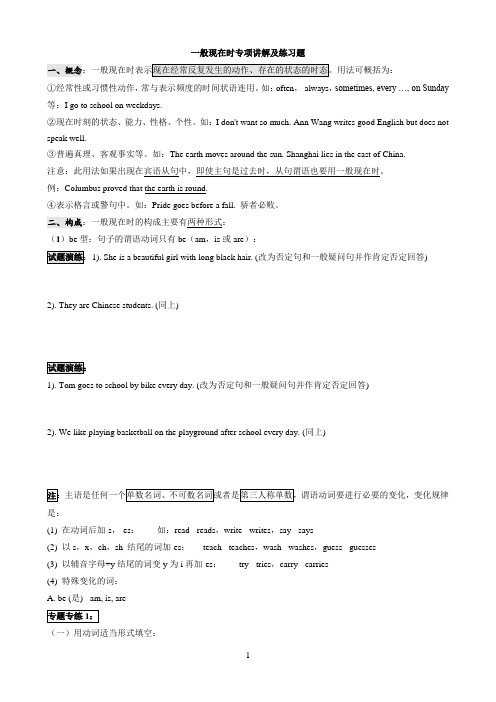
一般现在时专项讲解及练习题一、概念:一般现在时表示现在经常反复发生的动作、存在的状态的时态。
用法可概括为:①经常性或习惯性动作,常与表示频度的时间状语连用。
如:often,always,sometimes, every …, on Sunday 等;I go to school on weekdays.②现在时刻的状态、能力、性格、个性。
如:I don't want so much. Ann Wang writes good English but does not speak well.③普遍真理、客观事实等。
如:The earth moves around the sun. Shanghai lies in the east of China.注意:此用法如果出现在宾语从句中,即使主句是过去时,从句谓语也要用一般现在时。
例:Columbus proved that the earth is round.④表示格言或警句中。
如:Pride goes before a fall. 骄者必败。
二、构成:一般现在时的构成主要有两种形式:(1)be型:句子的谓语动词只有be(am,is或are):1). She is a beautiful girl with long black hair. (改为否定句和一般疑问句并作肯定否定回答)2). They are Chinese students. (同上)1). Tom goes to school by bike every day. (改为否定句和一般疑问句并作肯定否定回答)2). We like playing basketball on the playground after school every day. (同上)是:(1) 在动词后加-s,-es:如:read - reads,write - writes,say - says(2) 以s,x,ch,sh 结尾的词加-es:teach - teaches,wash - washes,guess - guesses(3) 以辅音字母+y结尾的词变y为i再加-es:try - tries,carry - carries(4) 特殊变化的词:A. be (是) - am, is, are(一)用动词适当形式填空:1. His radio is broken. It (sound)terrible.2. Did somebody drop water on the rug? It (look)wet.3. Every year my parents (give)me a present for my birthday.4. The club (send)her a letter every month.5. your dad (wash)his car once a week? Yes, he does.6. Lin Tao is a good student. He (study)very hard.7. They (work)at the bank.(二)句型转换:1. My living room has three windows. (改为强调语气、否定句、一般疑问句)2. We are in the same class. (改为强调语气、否定句、一般疑问句)4. He comes from England.(改为强调语气、否定句、一般疑问句)一、用所给动词的适当形式填空。
最新一般现在时态及第三人称单数(附练习及答案)
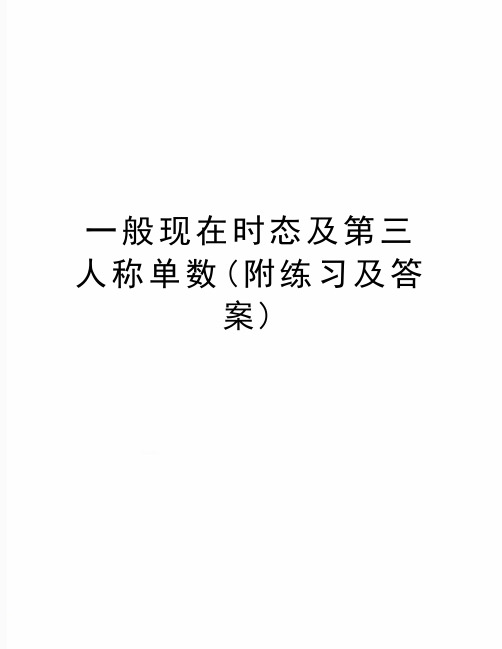
一般现在时态及第三人称单数(附练习及答案)一般现在时态及第三人称单数(附练习及答案)第三人称单数问题一般现在时中,当主语是第三人称单数时,即常在动词原形后加-s或-es。
第三人称单数变化,现归纳总结如下:1.人称代词he, she, it是第三人称单数。
如:He likes watching TV.他喜欢看电视。
She has lunch at twelve.她十二点吃午餐。
It looks like a cat.它看起来像只猫。
2.单个人名、地名或称呼作主语;用第三人称单数。
如:①Han Mei looks like her mother.韩梅看起来像她的母亲。
②Beijing is in China.北京在中国。
③Uncle Wang often makes cakes.王叔叔经常做蛋糕。
3.单数可数名词或"this / that / the/ a +单数可数名词"作主语时,是第三人称单数。
如:①A horse is a useful animal.马是有用的动物。
②This book is yours.这本书是你的。
③That car is red.那辆小汽车是红色的。
④The cat is Lucy's.这只猫是露茜的。
4.不定代词someone, somebody, nobody, everything, something等及指示代词this, that作主语时,第三人称单数。
①Everyone is here.大家到齐了。
②There is something wrong with the watch.这块手表有毛病。
③This is a pen.这是一支钢笔。
④That is an eraser.那是一块橡皮擦。
5.不可数名词作主语时为第三人称单数。
如:①The milk is in the glass. ②The bread is very small.6.当数字或字母作主语时,看作第三人称单数。
用所给词的适当形式填空做题规律总结及典型例题
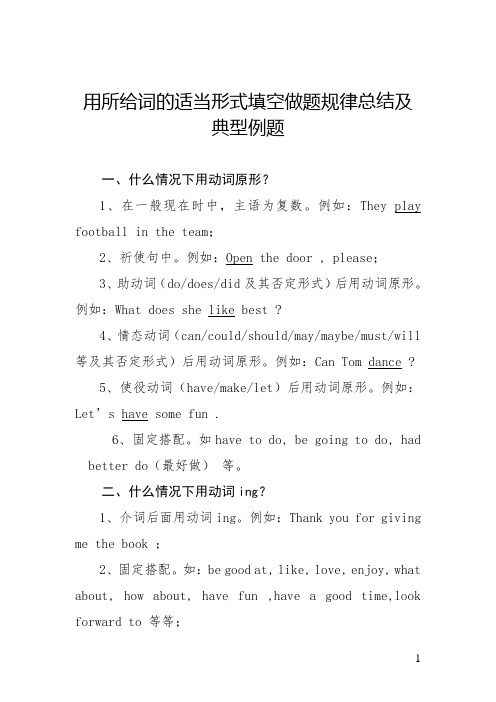
用所给词的适当形式填空做题规律总结及典型例题一、什么情况下用动词原形?1、在一般现在时中,主语为复数。
例如:They play football in the team;2、祈使句中。
例如:Open the door , please;3、助动词(do/does/did及其否定形式)后用动词原形。
例如:What does she like best ?4、情态动词(can/could/should/may/maybe/must/will 等及其否定形式)后用动词原形。
例如:Can Tom dance ?5、使役动词(have/make/let)后用动词原形。
例如:Let’s have some fun .6、固定搭配。
如have to do, be going to do, had better do(最好做)等。
二、什么情况下用动词ing?1、介词后面用动词ing。
例如:Thank you for giving me the book ;2、固定搭配。
如:be good at, like, love, enjoy, what about, how about, have fun ,have a good time,look forward to 等等;3、go+动词ing。
例如:go swimming, go shopping, go fishing, go skating等等;4、课程。
Reading lesson, Dancing lesson, Drawing lesson等等5、标识。
No Smoking, No Parking等等;6、动词ing开头做主语。
例如:Smoking is bad for your health.7、进行时态。
Be动词+动词ing。
例如:I am doing my homework now .动词ing变形规则:一般加ing,以e结尾的去e加ing (make、take等,但see除外);以“辅音+元音+辅音”结尾的双写最后一个字母加ing(swim/run)。
一般现在时练习题2 带答案
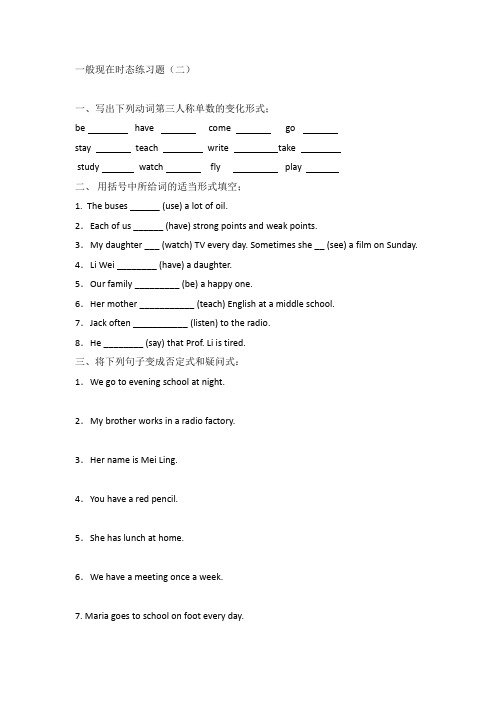
一般现在时态练习题(二)一、写出下列动词第三人称单数的变化形式;be have come gostay teach write takestudy watch fly play二、用括号中所给词的适当形式填空;1. The buses ______ (use) a lot of oil.2.Each of us ______ (have) strong points and weak points.3.My daughter ___ (watch) TV every day. Sometimes she __ (see) a film on Sunday. 4.Li Wei ________ (have) a daughter.5.Our family _________ (be) a happy one.6.Her mother ___________ (teach) English at a middle school.7.Jack often ___________ (listen) to the radio.8.He ________ (say) that Prof. Li is tired.三、将下列句子变成否定式和疑问式:1.We go to evening school at night.2.My brother works in a radio factory.3.Her name is Mei Ling.4.You have a red pencil.5.She has lunch at home.6.We have a meeting once a week.7. Maria goes to school on foot every day.8. My father smokes after meals.9. They always help people in need.10. I want to be a teacher.四、单项选择1. The Browns ________ a nice car and Brown's brother ________ a nice jeep.A. have / haveB. has / hasC. have / hasD. has / have2. If their house ________ not like ours, what ________ it look like?A. is / isB. is / doesC. does / doesD. does / is3. - ____ you think he will come? - If it ________ tomorrow, he will not come.A. Do / rainsB. Are / rainsC. Do / will rainD. Are / will rain4. The little child ____ not even know that the moon ________ around the earth.A. do / moveB. do / movesC. does / movesD. did / moved5. Many a student ___ fond of films, but a good student seldom __to the cinemaA. are / goesB. is / goesC. are / goD. is /五.用所给词的正确形式填空。
小升初英语-用所给词的适当形式填空(教师版)
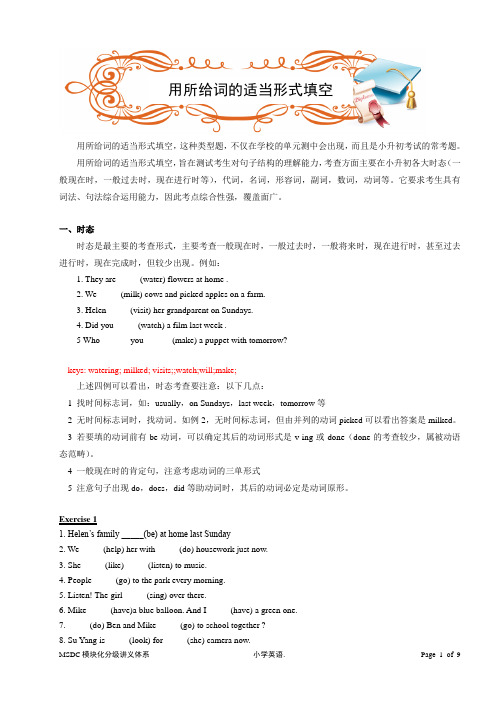
用所给词的适当形式填空用所给词的适当形式填空,这种类型题,不仅在学校的单元测中会出现,而且是小升初考试的常考题。
用所给词的适当形式填空,旨在测试考生对句子结构的理解能力,考查方面主要在小升初各大时态(一般现在时,一般过去时,现在进行时等),代词,名词,形容词,副词,数词,动词等。
它要求考生具有词法、句法综合运用能力,因此考点综合性强,覆盖面广。
一、时态时态是最主要的考查形式,主要考查一般现在时,一般过去时,一般将来时,现在进行时,甚至过去进行时,现在完成时,但较少出现。
例如:1. They are _____(water) flowers at home .2. We_____ (milk) cows and picked apples on a farm.3. Helen _____(visit) her grandparent on Sundays.4. Did you _____(watch) a film last week .5 Who ______ you______ (make) a puppet with tomorrow?keys: watering; milked; visits;;watch;will;make;上述四例可以看出,时态考查要注意:以下几点:1 找时间标志词,如:usually,on Sundays,last week,tomorrow等2 无时间标志词时,找动词。
如例2,无时间标志词,但由并列的动词picked可以看出答案是milked。
3 若要填的动词前有be动词,可以确定其后的动词形式是v-ing或done(done的考查较少,属被动语态范畴)。
4 一般现在时的肯定句,注意考虑动词的三单形式5 注意句子出现do,does,did等助动词时,其后的动词必定是动词原形。
Exercise 11. Helen’s family _____(be) at home last Sunday2. We _____(help) her with _____(do) housework just now.3. She _____(like)_____ (listen) to music.4. People _____(go) to the park every morning.5. Listen! The girl _____(sing) over there.6. Mike _____(have)a blue balloon. And I_____ (have) a green one.7. _____(do) Ben and Mike _____(go) to school together ?8. Su Yang is_____ (look) for _____(she) camera now.9. New Year’s Day is_____ (come).10. Now the children are_____ (sing) the song.keys: were; helped; doing; likes; listening; go; is singing; has; have; Do go; looking ; her;c oming; singing Exercise 21. Mike_____ (not) like listening to music.2. Wang Bin _____(give) Ben a new model plane as a birthday present yesterday.3. Listen! The little girl is_____ (cry).4 The man in a white shirt is _____ the park (keep).5. Ben often _____(have) breakfast at seven in the morning.6. I_____ (be) at school a moment ago, I _____(be) at home now.7. The girl _____(visit) Doctor Wang last month.8. We are_____ (have) a birthday party.9. She _____(draw) pictures every week.10. Your shoes_____ (be) there just now.keys:doesn’t; gave; crying; keeping; has; was; am; visited; having; draws; were;二、代词代词的考查常表现为人称代词的主格和宾格,物主代词的形容词性和名词性的区别以及some与any的区别。
(完整word版)初中英语一般现在时经典练习题
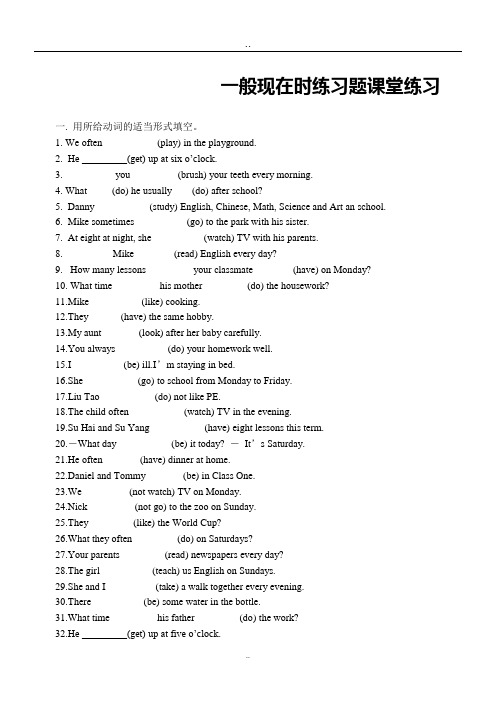
一般现在时练习题课堂练习一. 用所给动词的适当形式填空。
1. We often___________(play) in the playground.2. He _________(get) up at six o’clock.3. __________you _________(brush) your teeth every morning.4. What (do) he usually (do) after school?5. Danny __________ (study) English, Chinese, Math, Science and Art an school.6. Mike sometimes __________(go) to the park with his sister.7. At eight at night, she __________(watch) TV with his parents.8. ________ Mike________(read) English every day?9. How many lessons _________your classmate________(have) on Monday?10. What time _________his mother_________(do) the housework?11.Mike __________(like) cooking.12.They ______(have) the same hobby.13.My aunt _______(look) after her baby carefully.14.You always__________ (do) your homework well.15.I __________(be) ill.I’m staying in bed.16.She __________ (go) to school from Monday to Friday.17.Liu Tao __________ (do) not like PE.18.The child often __________ (watch) TV in the evening.19.Su Hai and Su Yang __________ (have) eight lessons this term.20.-What day __________ (be) it today? -It’s Saturday.21.He often _______(have) dinner at home.22.Daniel and Tommy _______(be) in Class One.23.We _________(not watch) TV on Monday.24.Nick _________(not go) to the zoo on Sunday.25.They ________ (like) the World Cup?26.What they often ________ (do) on Saturdays?27.Your parents ________ (read) newspapers every day?28.The girl ________ (teach) us English on Sundays.29.She and I ________(take) a walk together every evening.30.There ________ (be) some water in the bottle.31.What time_________ his father_________(do) the work?32.He _________(get) up at five o’clock.33.__________ you _________(brush) your teeth every morning.34.What ________ ( do ) he usually ________( do ) after school?35.Tom ________ ( study ) English, Chinese, Math, Science and Art at school.36.Kitty sometimes __________(go) to the park with his sister.37.At eight at night, she __________( watch ) TV with her parents.38.________ Mike________( read ) English every day?39.How many lessons________ your classmates______( have ) on Monday?40.We often___________ ( play ) football in the playground.二. 选择() 1._____ you have a book?A.DoB.AreC.IsD.Have( )2.They _________ on a farm.A.workingB.is workC.workD.is worked() 3.Does Peter like to watch TV? __________.A.Yes, he likeB.No, he doesn’tC.Yes, he’d likeD.No, he likes ()4.She doesn’t __________ her homework in the afternoon.A.doingB.to doC.doesD.do( )5.How ____________ Mr.Brown ___________ to America?A.do, goB.is, goC.does, goD.does, goes ()6.Where’s my camera? I____________ it.A.am not findingB.am not seeingC.can’t findD.can’t look at ()7.How ___________ he go to work? He ___________ to work by bike.A.does ;goB.do; goesC.do ;goD.does ;goes()8—______ you usually late for school?—No, _____________.A.Do ; I amB.Does ;notC.Are ; I’m notD.Are ; I aren’t ( )9._____ she _____ home at six every day?A.Is , leaveB.Does , leaveC.Is , leavesD.Does , left()10.Mr.Yang ____________ English this term.A.teaches ourB.teaches usC.teachs usD.teach our()11.He can ______ Chinese and English.A.speak.B.speaks .C.tell.D.say()12.Do you want _______with actors?A .work . B.works . C.to work. D working( )13.A nurse usually _______a white uniform.A.wear .B.wearing.C.wears. D to wear()14._____you from Japan?A.AreB.Do.C.DoesD.Is()15.What language do you_______?A.sayB.talkC.tell . D speak。
(完整版)一般现在时专项练习题
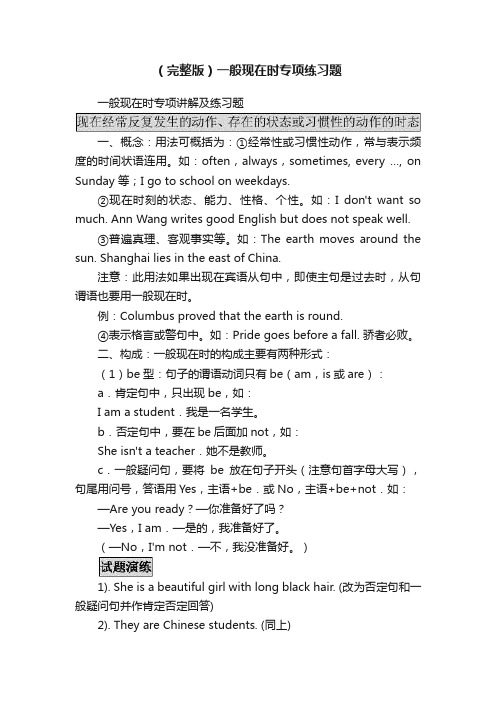
(完整版)一般现在时专项练习题一般现在时专项讲解及练习题一、概念:用法可概括为:①经常性或习惯性动作,常与表示频度的时间状语连用。
如:often,always,sometimes, every …, on Sunday 等;I go to school on weekdays.②现在时刻的状态、能力、性格、个性。
如:I don't want so much. Ann Wang writes good English but does not speak well.③普遍真理、客观事实等。
如:The earth moves around the sun. Shanghai lies in the east of China.注意:此用法如果出现在宾语从句中,即使主句是过去时,从句谓语也要用一般现在时。
例:Columbus proved that the earth is round.④表示格言或警句中。
如:Pride goes before a fall. 骄者必败。
二、构成:一般现在时的构成主要有两种形式:(1)be型:句子的谓语动词只有be(am,is或are):a.肯定句中,只出现be,如:I am a student.我是一名学生。
b.否定句中,要在be后面加not,如:She isn't a teacher.她不是教师。
c.一般疑问句,要将be放在句子开头(注意句首字母大写),句尾用问号,答语用Yes,主语+be.或No,主语+be+not.如:—Are you ready?—你准备好了吗?—Yes,I am.—是的,我准备好了。
(—No,I'm not.—不,我没准备好。
)1). She is a beautiful girl with long black hair. (改为否定句和一般疑问句并作肯定否定回答)2). They are Chinese students. (同上)(2)实义动词型:句中的谓语动词为实义动词(也叫行为动词):a.肯定句中,只出现实义动词,如:I get up in the morning.我早晨起床。
一般现在时 适当形式填空练习
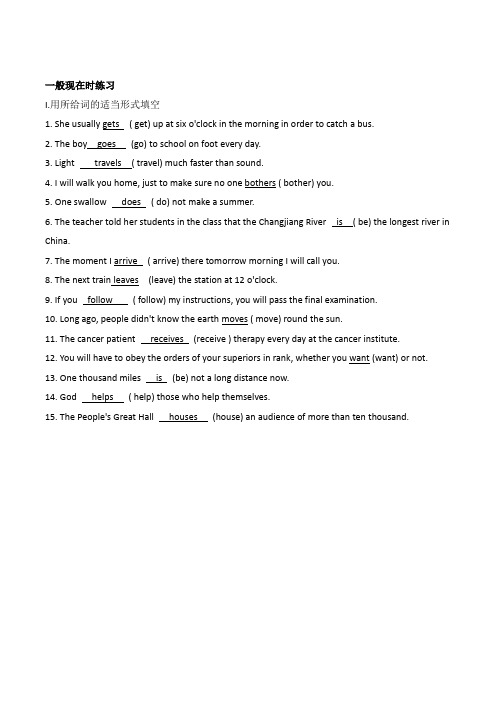
一般现在时练习I.用所给词的适当形式填空1. She usually gets ( get) up at six o'clock in the morning in order to catch a bus.2. The boy goes (go) to school on foot every day.3. Light travels ( travel) much faster than sound.4. I will walk you home, just to make sure no one bothers ( bother) you.5. One swallow does ( do) not make a summer.6. The teacher told her students in the class that the Changjiang River is ( be) the longest river in China.7. The moment I arrive ( arrive) there tomorrow morning I will call you.8. The next train leaves (leave) the station at 12 o'clock.9. If you follow ( follow) my instructions, you will pass the final examination.10. Long ago, people didn't know the earth moves ( move) round the sun.11. The cancer patient receives (receive ) therapy every day at the cancer institute.12. You will have to obey the orders of your superiors in rank, whether you want (want) or not.13. One thousand miles is (be) not a long distance now.14. God helps ( help) those who help themselves.15. The People's Great Hall houses (house) an audience of more than ten thousand.。
(完整版)小学五年级一般现在时专项练习
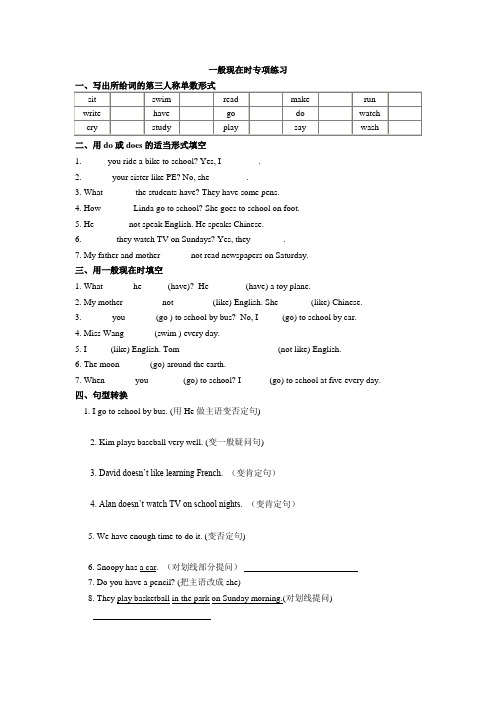
一般现在时专项练习二、用do或does的适当形式填空1. _____ you ride a bike to school? Yes, I ________.2. ______ your sister like PE? No, she ________.3. What_______ the students have? They have some pens.4. How_______ Linda go to school? She goes to school on foot.5. He _______ not speak English. He speaks Chinese.6. _______ they watch TV on Sundays? Yes, they _______.7. My father and mother ______ not read newspapers on Saturday.三、用一般现在时填空1. What ______ he _____ (have)? He ________(have) a toy plane.2. My mother ________ not________ (like) English. She _______(like) Chinese.3. ______ you ______ (go ) to school by bus? No, I _____(go) to school by car.4. Miss Wang ______ (swim ) every day.5. I _____(like) English. Tom ______ _______ _______(not like) English.6. The moon ______ (go) around the earth.7. When ______ you _______ (go) to school? I ______(go) to school at five every day.四、句型转换1. I go to school by bus. (用He做主语变否定句)________________________________________2. Kim plays baseball very well. (变一般疑问句)________________________________________3. David doesn’t like learning French. (变肯定句)________________________________________4. Alan doesn’t watch TV on school nights. (变肯定句)________________________________________5. We have enough time to do it. (变否定句)________________________________________6. Snoopy has a car. (对划线部分提问) _______ ________________7. Do you have a pencil? (把主语改成she) ______________________8. They play basketball in the park on Sunday morning.(对划线提问)一.用括号内动词的适当形式填空:A. 1. What ______ (do) he usually ______ (do) after school?2. Danny _________(study) English, Chinese, maths, Science and Art at school.3. Mike sometimes __________(go) to the park with his sister.4. ________ Mike________(read) English every day?5. How many lessons_________ your classmates ________(have) on Monday?6. What time_________ his mother_________(do) the housework?7. _________you _________(brush) your teeth every morning?8. The girl _______ (look) beautiful.B.1. He often_________ (have) dinner at home.2. Daniel and Tommy ________(be) in Class One.3. We _______________ (not watch) TV on Monday.4. Nick_________________(not go) to the zoo on Sunday.5. ________ they __________ (like) the World Cup?6. What _____ they often_____________ (do) on Saturdays?7. ________ your parents ______________ (read) newspapers every day?8. The girl ___________(teach) us English on Sundays.9. She and I ___________ (take) a walk together every evening.10. There ___________ (be) some water in the bottle.11. Mike _____________ (like) cooking.12. They __________ (have) the same hobby.13. My aunt ___________ (look) after her baby carefully.14. You always ______________(do) your homework well.15. I __________ (be) ill. I’m staying in bed.16. She___________ (go) to school from Monday to Friday.17. Liu Tao ___________ (do) not like PE.18. The child often ________________ (watch) TV in the evening.19. Su Hai and Su Yang _____________ (have) eight lessons this term.20. -What day___________(be) it today?-It’s Saturday.二、按照要求改写句子1. Daniel watches TV every evening.(改为否定句)2. I do my homework every day.(改为一般疑问句,作否定回答)3. She likes milk.(改为一般疑问句,作肯定回答)4. Amy likes playing computer games.(改为一般疑问句,作否定回答)5. We go to school every morning.(改为否定句)6. He speaks English very well.(改为否定句)7. I like taking photos in the park.(对划线部分提问)8. John comes from Canada.(对划线部分提问)9. She is always a good student.(改为一般疑问句,作否定回答)10. Simon and Daniel like going skating.(改为否定句)三、改错1. Is your brother speak English?2. Does he likes going fishing?3. He likes play games after class.4. Mr. Wu teachs us English.5. She don’t do her homework on Sundays.I、用括号中所给词的适当形式填空:1.The buses ______ (use) a lot of oil.2.Each of us ______ (have) strong points and weak points.3.My daughter _________ (watch) TV every day. Sometimes she _______ (see) a film on Sunday.4.Li Wei ________ (have) a daughter. She stays _______ in a nursery.5.Our family _________ (be) a happy one.6.Her mother ___________ (teach) English at a middle school.7.Jack often ___________ (listen) to the radio.8.He ________ (say) that Prof. Li is _____ tired.9. We often___________(play) in the playgound.10. He _________(get) up at six o’clock.11. __________you _________(brush) your teeth every morning.12. What (do) he usually (do) after school?13. Danny (study) English,Chinese,Maths,Science and Art at school.14. Mike sometimes __________(go) to the park with his sister.15. At eight at night, she __________(watch) TV with his parents.16. ________ Mike________(read) English every day?17. How many lessons_________your classmate________(have) on Monday?18. What time_________ his mother_________(do) the housework?改句子1. Do you often play football after school? (肯定回答)2. I have many books. (改为否定句)3. Gao Shan’s sister likes playing table tennis (改为否定句)4. She lives in a small town near New York. (改为一般疑问句)5. I watch TV every day. (改为一般疑问句)6. David has got a goal. (改为一般疑问句)7. We have four lessons.(否定句)8. Nancy doesn’t run fast (肯定句)9. My dog runs fast. 否定句:一般疑问句:10. Mike has two letters for him. 一般疑问句:否定句:11. I usually play football on Friday afternoon. 否定句: 一般疑问句: 划线提问12.12.Su Yang usually washes some clothes on Saturday.否定句: 一般疑问句: 划线提问:13. Mingming usually waters the flowers every day 否定句: 一般疑问句: 划线提问14.Tom does his homework at home. 否定句: 一般疑问句: 划线提问一般现在时练习题1. We often___________(play) in the playgound.2. He _________(get) up at six o’clock.3. __________you _________(brush) your teeth every morning.4. What __________ (do) he usually __________ (do) after school?5. Danny__________ (study) English, Chinese, Maths, Science and Art an school.6. Mike sometimes __________(go) to the park with his sister.7. At eight at night, she __________(watch) TV with his parents.8. ________ Mike________(read) English every day?9. How many lessons _________your classmate________(have) on Monday?10. What time _________his mother_________(do) the housework?改句子1. Do you often play football after school? (肯定回答)2. I have many books. (改为否定句)3. Gao Shan’s sister likes playing table tennis (改为否定句)4. She lives in a small town near New York. (改为一般疑问句)5. I watch TV every day. (改为一般疑问句)6. David has got a goal. (改为一般疑问句)7. We have four lessons.(否定句)8. Nancy doesn’t run fast (肯定句)9. My dog runs fast. (否定句,一般疑问句)10. Mike has two letters for him. (否定句,一般疑问句)11. I usually play football on Friday afternoon.否定句:一般疑问句:12. Su Yang usually washes some clothes on Saturday.否定句:一般疑问句:13. Mingming usually waters the flowers every day否定句:般疑问句:14. Tom does his homework at home.否定句:一般疑问句:1.This is my pencil.(变一般疑问句)______ _______ your pencil ?2. These red socks are Kate’s . (变一般疑问句)______ ______ socks Kat e’s ?3. I want to buy a big green bag . (变特殊疑问句) ______ ______ you want to buy ?4. Mary does not have any books . (变肯定句)Mary ______books .5. The clothing shop is on sale . (变为否定)________________________________.6. She likes the black bag very much . (变为否定句) ______________________________.7. I buy the pants for only 50 Yuan. (用she改写句子)____ _____ the pants for only 50 Yuan.8. It’s an English dictionary . (对画线部分提问) ____________________________?9. Lily and Lucy are fifteen years old now . (对画线部分提问)_____ ______ Lily and Lucy ?10. Her dog is 2 years and 5 months old . (变为否定句)Her dog ____ _____ 2 years and 5 months old .11. We live in Nanchang. (改为否定句) We ____ ____ ____ in Nanchang .12. It’s lunch time.(改为同义句)It’s ______ ______ ______.13. My sweater is black and white. (对划线部分提问) ______ ______ is ______ sweater?14. She has long, black hair. (改为同义句) ____ hair ____ long and black.15.. They are three blue desks. (对划线部分提问) ____ ____ they?二.用be动词的适当形式填空。
一般现在时(用单词适当形式填空 30题 含解析)初中英语专题练习 (3)
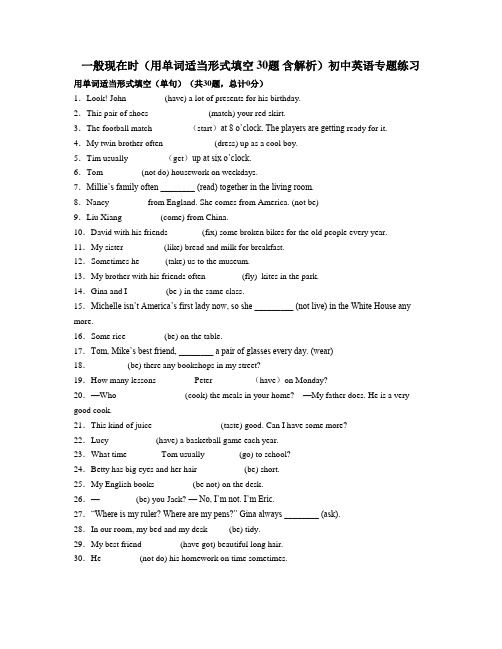
一般现在时(用单词适当形式填空 30题含解析)初中英语专题练习用单词适当形式填空(单句)(共30题,总计0分)1.Look! John ________ (have) a lot of presents for his birthday.2.This pair of shoes _____________ (match) your red skirt.3.The football match ________(start)at 8 o’clock. The players are getting ready for it.4.My twin brother often ___________ (dress) up as a cool boy.5.Tim usually ________(get)up at six o’clock.6.Tom ________ (not do) housework on weekdays.7.Millie’s family often ________ (read) together in the living room.8.Nancy ________ from England. She comes from America. (not be)9.Liu Xiang ________ (come) from China.10.David with his friends _______ (fix) some broken bikes for the old people every year. 11.My sister _________(like) bread and milk for breakfast.12.Sometimes he _____ (take) us to the museum.13.My brother with his friends often ________(fly) kites in the park.14.Gina and I ________ (be ) in the same class.15.Michelle isn’t America’s first lady now, so she _________ (not live) in the White House any more.16.Some rice ________ (be) on the table.17.Tom, Mike’s best friend, ________ a pair of glasses every day. (wear)18.________ (be) there any bookshops in my street?19.How many lessons ________ Peter ________ (have)on Monday?20.—Who _______________ (cook) the meals in your home? —My father does. He is a very good cook.21.This kind of juice _______________ (taste) good. Can I have some more?22.Lucy __________ (have) a basketball game each year.23.What time _______ Tom usually _______ (go) to school?24.Betty has big eyes and her hair __________ (be) short.25.My English books ________ (be not) on the desk.26.—________ (be) you Jack? —No, I’m not. I’m Eric.27.“Where is my ruler? Where are my pens?” Gina always ________ (ask).28.In our room, my bed and my desk ____ (be) tidy.29.My best friend ________ (have got) beautiful long hair.30.He ________ (not do) his homework on time sometimes.【参考答案】用单词适当形式填空(单句)(共30题,总计0分)1.has【详解】句意:看!约翰有很多生日礼物。
六年级各种时态的适当形式填空汇总
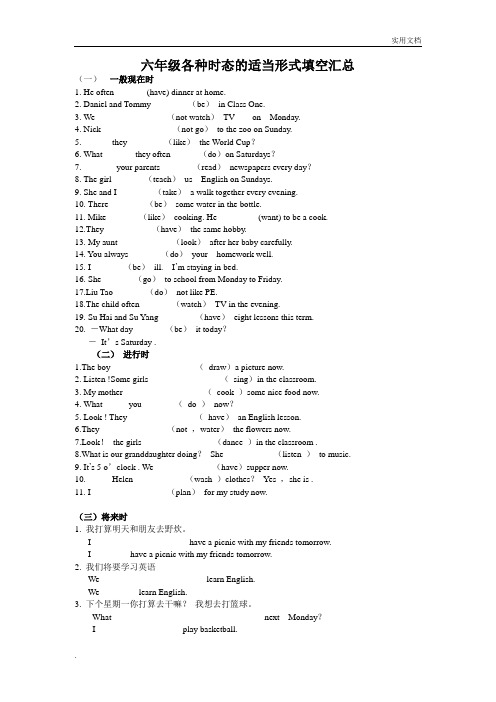
六年级各种时态的适当形式填空汇总(一)一般现在时1. He often _______(have) dinner at home.2. Daniel and Tommy _______ (be)in Class One.3. We ________________(not watch)TV on Monday.4. Nick ________________(not go)to the zoo on Sunday.5. ______ they ________(like)the World Cup?6. What _______they often ______(do)on Saturdays?7. _______ your parents _______(read)newspapers every day?8. The girl _______(teach)us English on Sundays.9. She and I ________(take)a walk together every evening.10. There ________(be)some water in the bottle.11. Mike _______(like)cooking. He _________(want) to be a cook.12.They___________(have)the same hobby.13. My aunt ____________(look)after her baby carefully.14. You always _______(do)your homework well.15. I _______(be)ill. I’m staying in bed.16. She _______(go)to school from Monday to Friday.17.Liu Tao _______(do)not like PE.18.The child often _______(watch)TV in the evening.19. Su Hai and Su Yang _______ (have)eight lessons this term.20. -What day _______(be)it today?-It’s Saturday .(二)进行时1.The boy __________________ (draw)a picture now.2. Listen !Some girls _______________ (sing)in the classroom.3. My mother _________________ (cook )some nice food now.4. What _____ you ______ (do )now?5. Look ! They _______________(have)an English lesson.6.They _______________(not ,water)the flowers now.7.Look!the girls ________________(dance )in the classroom .8.What is our granddaughter doing?She ___________(listen )to music.9. It’s 5 o’clock . We _____________(have)supper now.10.______Helen____________(wash )clothes?Yes ,she is .11. I ________________ (plan)for my study now.(三)将来时1. 我打算明天和朋友去野炊。
